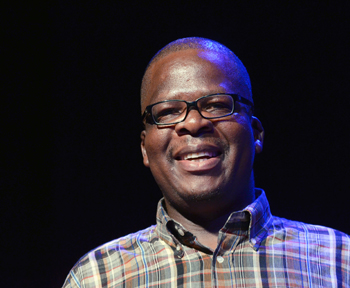‘Many people disagree with me. My life is One Long Debate.’ – Ali A. Mazrui

Prof Ndlovu-Gatsheni
Photo: Stephen Collet
|
The Vice-Chancellor and Rector, in conjunction with the Centre for Africa Studies, recently presented a memorial lecture in honour of the work and life of an academic giant, the late Prof Ali A. Mazrui.
Ali Al'amin Mazrui (24 February 1933 – 12 October 2014), was an academic professor and political writer on African and Islamic studies. Hy was born in Mombasa, Kenya and was an Albert Schweitzer Professor in the Humanities, as well as Director of the Institute of Global Cultural Studies at Binghamton University, New York.
The lecture, held on Thursday 30 October 2014 in the Albert Wessels Auditiorium, was presented by Prof Sabelo J. Ndlovu-Gatsheni, Head of the Archie Mafeje Research Institute (AMRI) at UNISA.
His memorial lecture was entitled ‘Ali A Mazrui on the Invention of Africa and Postcolonial Predicaments’.
Prof Ndlovu-Gatsheni has published widely, including more than 47 articles in peer-reviewed journals, 45 chapters in books and 8 books. This includes The Ndebele Nation: Reflections on Hegemony, Memory and Historiography (Amsterdam & Pretoria: Rozenberg Publishers & UNISA Press, 2009), as well as Bondage of Boundaries and Identity Politics in Postcolonial Africa: The ‘Northern Problem’ and Ethno-Futures (Pretoria: Africa Institute of South Africa, 2013).
Prof Sabelo J Ndlovu-Gatsheni speech: ‘Ali A Mazrui on the Invention of Africa and Postcolonial Predicaments’.